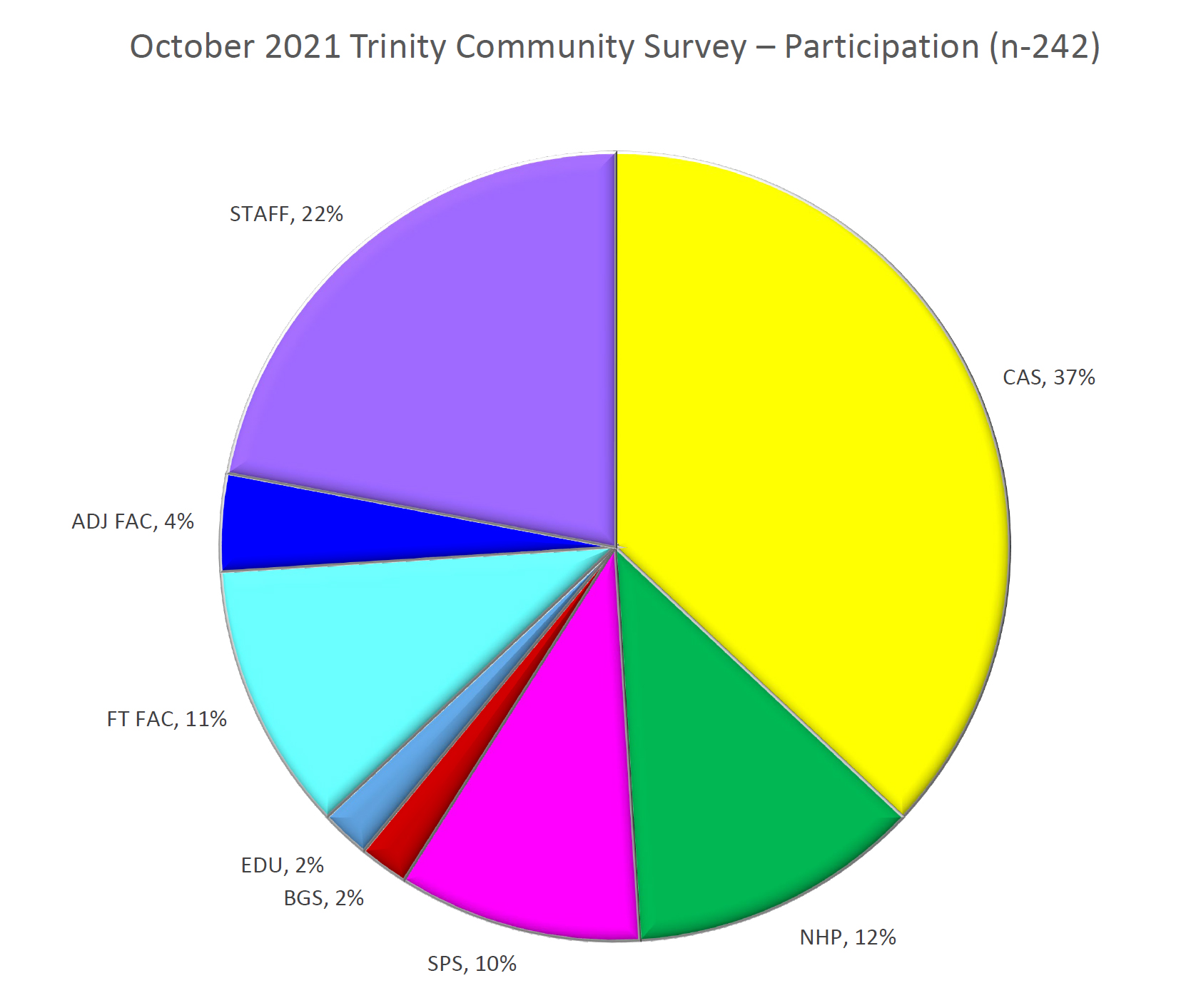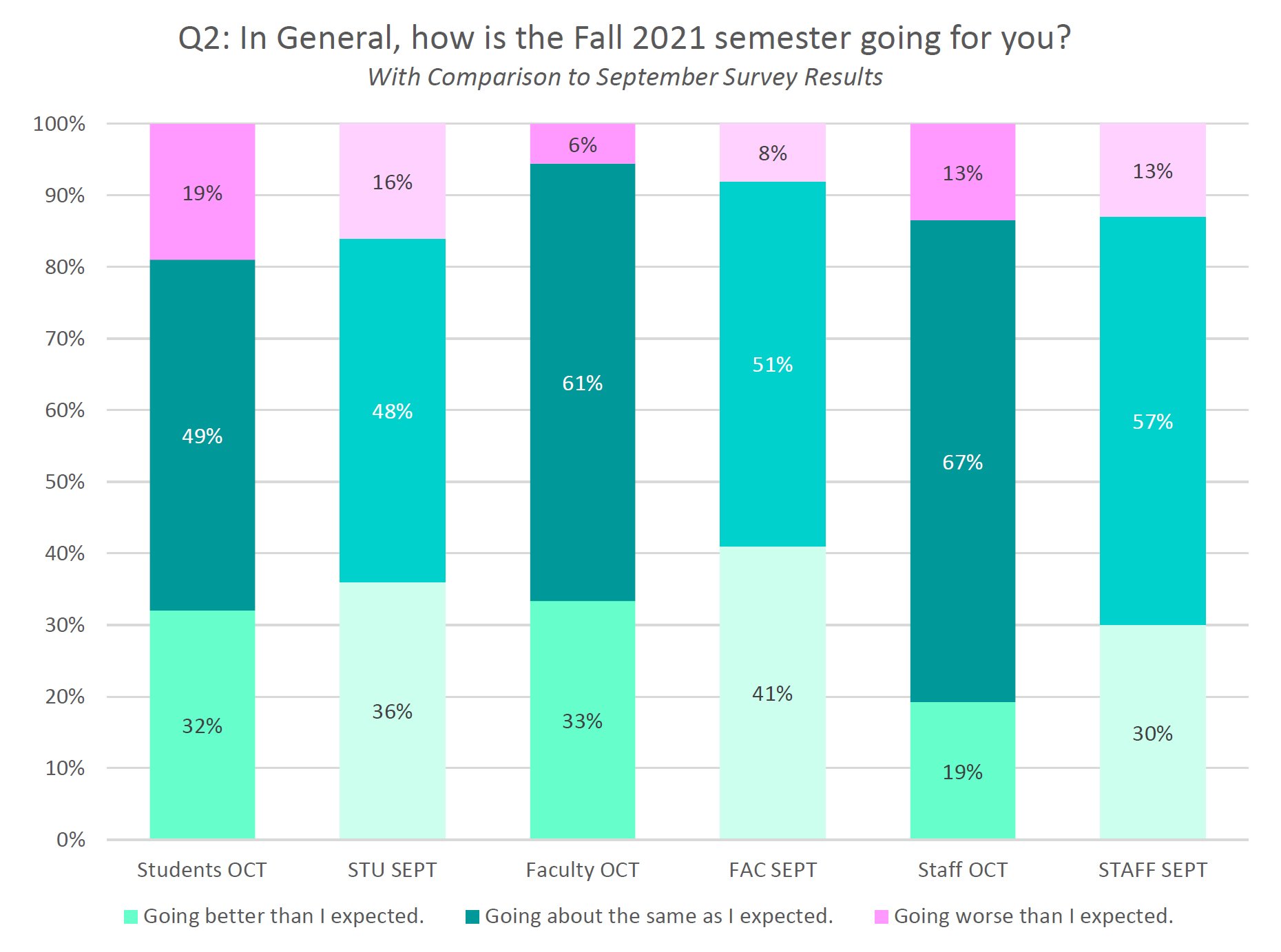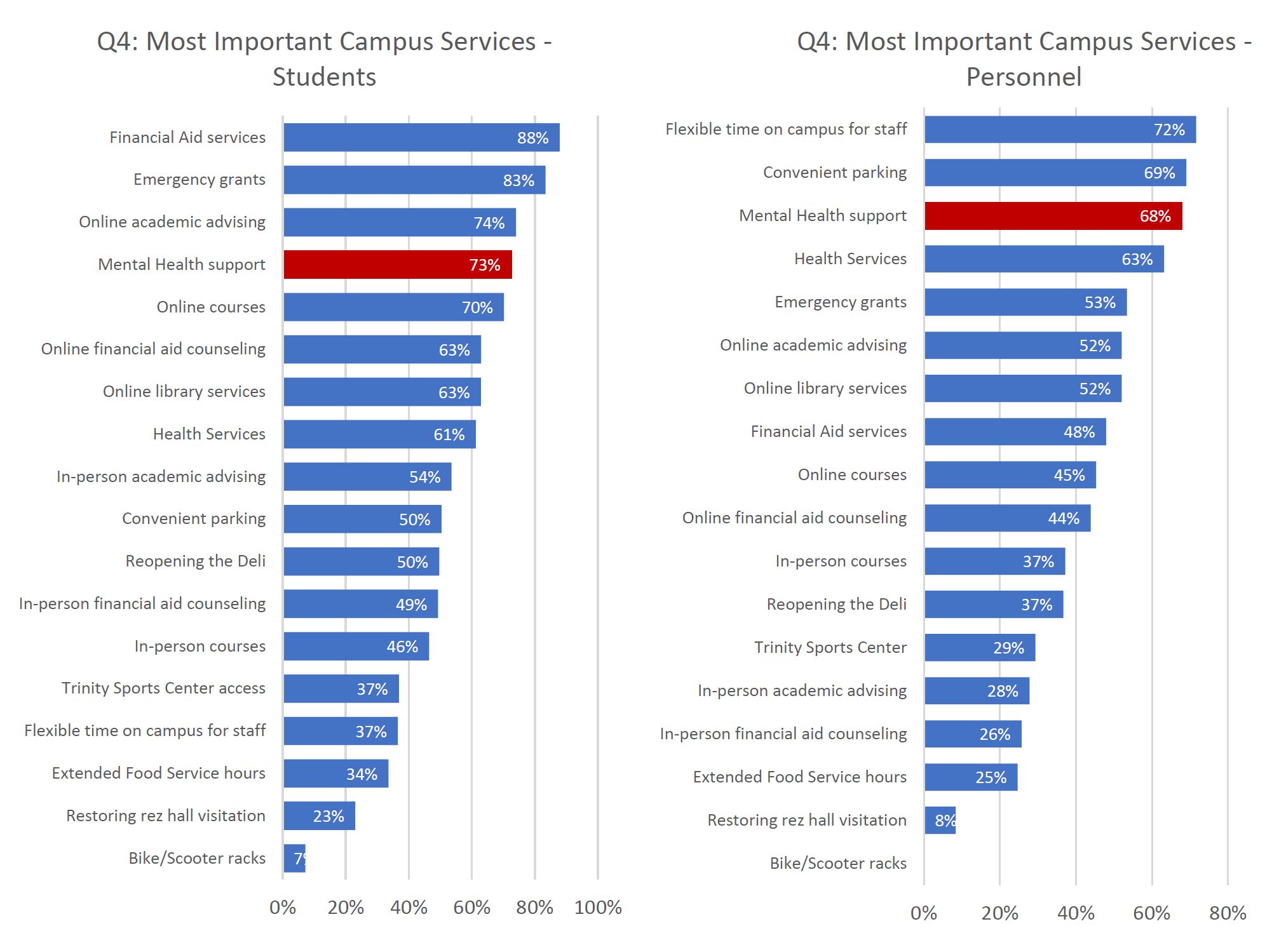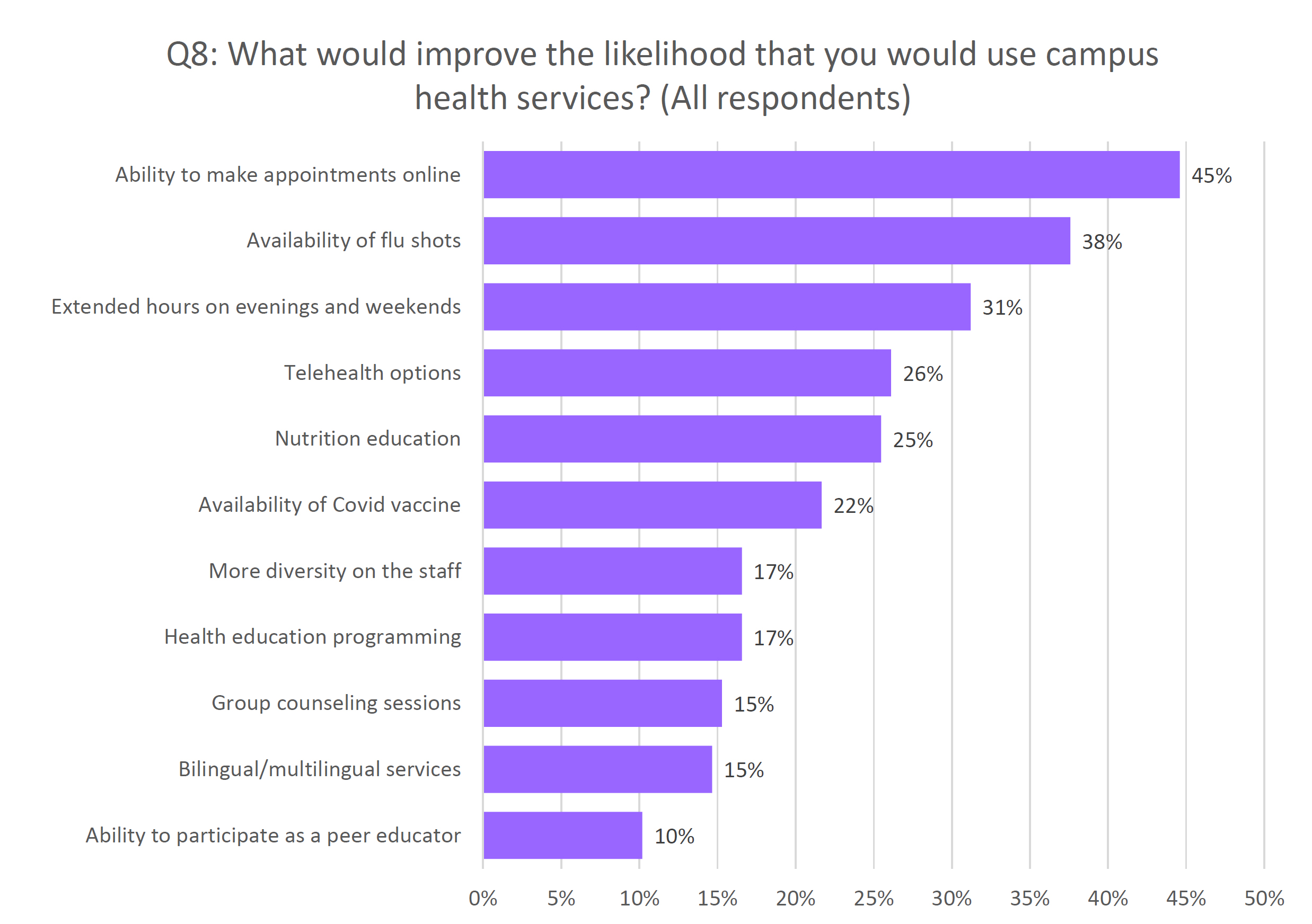
OCTOBER COMMUNITY SURVEY – CAMPUS HEALTH

We conducted the October Community Survey with a focus on campus Health Services and questions about personal health. The results are eye-opening and will prompt a number of changes in our services. I am very grateful to MSN Student Allison Martin, RN, who has also recently joined the Health Services team, for suggesting the survey and providing questions. Thanks as well to Professor Erika Ross and her students in SNHP 330 for providing questions, and to MPH/Health Services Program Director Dr. Nicole Betschman and NHP Dean Dr. Brigid Noonan. This survey provides baseline data for additional research as well as action to improve everyone’s health on campus.
The “word cloud” above depicts the results of the final question for everyone on campus — the question asked each respondent to write-in what she or he might do to improve their health. The #1 response was “exercise” followed closely by better nutrition, losing weight and reducing stress. The question followed a prior question asking respondents to assess their health status on a 1-10 scale. Overall, the assessment is “good” to “improving” but there’s a lot of room for improvement. More on this below.

242 members of the campus community completed the survey, arrayed by cohort group as follows:

The opening question repeated a question that we’ve been using in surveys since the start of the pandemic: how’s it going? The point of this question is to take a general temperature of the community and the respective groups. Comparing results across the months is very interesting. On the below chart, we compare September and October responses for this semester:

What we can see here is that for faculty and staff, the semester is actually improving as a general rule. However, for students, the “worse than expected” answer increased from 16% to 19%. The comments on this question raised a number of important issues that we will be addressing in the days ahead. The concerns include:
a) Workload overload: a lot of comments not only by students but also by staff regarding too much work and feeling stressed out. We are asking faculty and deans to talk about this regarding coursework; we’ll be talking with supervisors and HR about the best ways to reduce staff stress over workload.
b) Online courses v. in-person courses: we are seeing comments both ways, with some students wanting more in-person courses and others asking for more online. CAS and NHP students are largely in-person for Fall 2021, but we have heard concern about wanting some online options. Provost Ocampo has worked with the deans to provide some options for students who are unable to attend in-person, but we cannot promise a return to fully online course work in these programs.
c) Mental Health support: a lot of comments cite stress, concerns about Covid, and general worry about personal health and mental health. We are looking at ways to provide increased counseling support for students as well as faculty and staff, and I hope to have more on this next week.
Some of the more notable comments on this question are:
SPS student: “It’s been pretty rough. Financially and mentally it’s been draining. The Scholarship that I’d previously received wasn’t offered, so now I have a balance that I was trying to avoid on my account. Also, I work at a school, and it’s been challenging to navigate all of the changes due to Covid-19.”
CAS student: “I am doing most of the stuff I planned to do and I still need to work harder to achieve better in some of my classes. However, commuting as a public transportation user is challenging on top of carrying a good portion of responsibility in my family.”
A CAS faculty member observes: “Students struggle to focus and stay on task more than usual. I find I am having to review material much more often than in the past and have had to drop sections and sometimes entire chapters because I have run out of time to discuss them. I have not had to do this in past semesters. Students are trying to listen and ask questions, but it’s like things are just not sinking in and sticking the way they have before. It is very different.”
A graduate student in NHP writes: “What I find unreasonable is the amount of course work expected by some professors. In order to get the highest amount of graduate students to complete the course and obtain a masters degree some flexibility must be expected of professors. Overall the institution has a caring nature and continuously teaches self-care as a model of professional growth, but the amount of course work to be turned in contradicts the model when some students are experiencing high levels of anxiety and can not do self-care as many juggle work, family and school. More flexibility is needed from professors.”
A staff member: “I feel overwhelmed. I feel that there is so much more work to do and I do not think I am doing a good job keeping up. I feel tired all the time.”
NHP graduate student: “As a student, I am concerned about my fellow classmates who may find it difficult to attend face-to-face classes in the Spring semester for various reasons. They include: 1. childcare concerns; 2. having to transfer to another school because they are unable to come on campus;(Some relocated outside of the DMV during the pandemic to save on rent and other expenses) 3. Vaccine related concerns. (Even if vaccinated, some persons are afraid to attend face-to-face classes because their children are unable to be vaccinated and they fear taking home COVID to them).”
Not all of the responses are concerning; some are actually very positive:
CAS student: “This is my first semester at TWU; I transferred here from Georgia State University. So far, I’ve had an incredible experience at Trinity. All of my professors are very helpful. I feel a genuine desire from all of my professors to see me succeed in school and after I graduate. My advisor has been very diligent about keeping me up to date with registration dates and took the time to set up my classes. Coming from a bigger institution, I feel valued and seen on this campus.”
SPS student at THEARC: “So far for the fall semester I have to great teachers, who give precise instructions and listens. I’m very happy with my classmates as well we communicate and piggyback off one another. ”
Another SPS student: “Due to me working full time, a full time mother, taking 3 to 4 classes and occasionally picking up side work on the weekends not to mention the safety precautions I have to take due to COVID. I am thankful that classes are given to the working adults online. I actually do better online than in person. I feel this should remain an option for SPS evening students who work during the day and have children. Its more beneficial.”
CAS student: “I’m so happy to be back on campus and learning in person, I feel like it’s definitely helped my learning experience compared to last semester or previous virtual semesters.”
CAS student: “I feel better being back on campus. When the pandemic hit, I was not doing well in my classes. Now that we are back on campus, I have improved and I am able to focus more in class. I learn so much better in person and I am happy to be back.”

As noted above in analyzing the results for Question 3 on “how’s it going” the campus community has raised concerns about support for mental health and stress reduction. Question 4, summarized above, asked about important services and the results are also illuminating. 73% of students and 68% of faculty and staff cited Mental Health services among their top 4 priorities.
For students, no surprises here, the very top priorities are financial aid, emergency grants, and the convenience of online advising.
For personnel, flextime is very important — and while we know that everyone wants convenient parking, we simply are unable to provide parking next to the building where every staff member works. We have instituted the campus shuttle loop to help those who do not wish to walk from the parking lots.
The comments on this question included a number of good suggestions including improving food service options, returning the Deli to some service hours, making dorm rooms available for commuters who need to stay overnight from time to time, expanding online services, providing longer shuttle hours at night, and once again, addressing the requests for more online course options.
Some of the comments expressed continuing concern about Covid safety on campus. We have had 25 reported cases since August within the Trinity community, but only two of those involved campus residents, and none of the cases involved transmission on campus. We have a very safe campus with a high vaccination rate and strong policies and practices for masking, hand washing, hygiene, testing. I provide all of the data in weekly messages to the campus community.
Questions Regarding Health Services
Questions 4 through 10 of the survey concerned Health Services and the personal health assessment. We are evaluating the answers very carefully as part of a plan to improve and expand Health Services in the new year. We appreciate everyone’s input.
Right now, fewer than 15% of the college community use health services according to this survey, a surprisingly low participation rate. 35% of the campus community has no idea where the Health Services center is located (4th Floor of Main Hall on the O’Connor wing overlooking the Well). Even among CAS students for whom health insurance is mandatory, only about 30% use Health Services on a routine basis. Students, faculty and staff who use Health Services do it largely to get flu shots, Covid tests, Counseling services, and some routine examinations or assistance when feeling ill.
Of those who have used Health Services, 44% rated the experience excellent, and 41% said it was satisfactory. Concerns expressed include the difficulty in making appointments, concerns about responsiveness, and overall lack of awareness of the services available.
Some of the respondents offered praise for the staff in Health Services, such as:
CAS student: “The new nurse is incredible.”
SPS student: “The counselor made me feel comfortable…”
CAS faculty: “Annie C is amazing.”
NHP student: “Anne Cosimano is a fantastic counselor and I’d recommend her to anyone.”

Perhaps the survey’s most important question concerned what improvements we should make in Health Services. Online appointments emerge as the #1 request, followed closely by flu shots, extended hours, and other topics. While I do not have all the answers right this minute as I write this blog, here are some important notes:
a) Online appointments: Health Services is installing a new Electronic Health Record system this semester, and it should be ready very soon. With the EHR system, you should be able to make online appointments! Hooray for that. the online system will also make it possible to address another topic of the survey, namely, having Covid-19 vaccine on site. D.C. Department of Health requires the online EHR in order to certify a clinic for Covid-19 vaccine distribution. If all goes well, we should have the vaccines here in time for the second semester, if not earlier. We also have procured the refrigeration units required to store the vaccine. The EHR system should also modernize billing and insurance interface, which should then make it possible for Trinity to consider new ways of delivering health services to a broader swatch of the campus population. Progress is on the way!
b) Flu shots: by now I hope you have seen that the Health Center now has flu shots and is offering the flu clinics on a schedule posted on the Health Services website.
c) Extended hours and Telehealth services: we will be assessing the staff capacity needed for extended hours and telehealth services; both are great ideas, and with some creative thinking we should be able to provide more options in 2022.
All of the other suggestions above are excellent, and we will take them into account as we develop plans for the future of health services. One of my goals is to create a plan through which Campus Health Services moves away from the outmoded model of serving mostly full-time undergraduates (or mostly residents), and instead, becomes a real health clinic serving the entire campus community. To do that, we have to understand the impact on staffing, space and resources. But with Healthcare now the leading arena for Trinity’s academic programs, our on-campus health services should be a stellar model for the kind of healthcare profession we are preparing our students to engage for their careers. In fact, with many clinical partners already for our academic programs, a great faculty and very successful graduates, I am confident that we can make Campus Health Services a true model program for the future of healthcare for our campus community.
Many thanks to everyone who participated in shaping and answering the survey. Now, let’s get walking, swimming, exercising, and fulfilling all of those resolutions we identified in the answer to Question 10! As a reminder:
